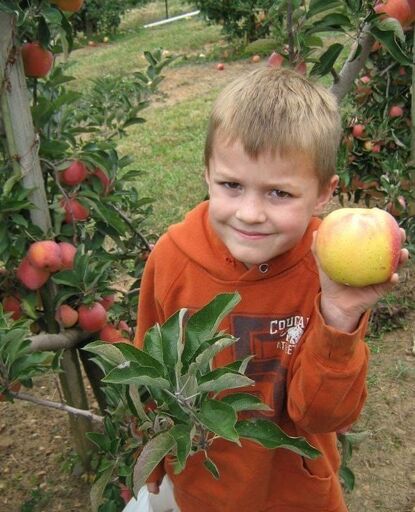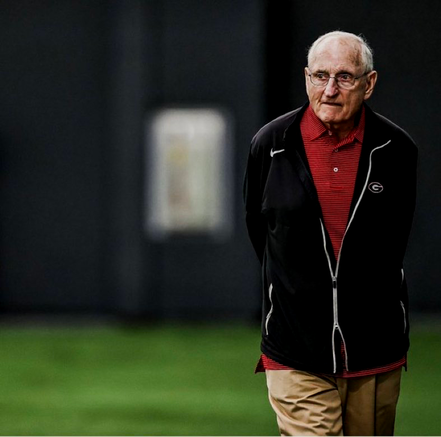 The writer, in earlier times, appreciating the bounty of the Earth The writer, in earlier times, appreciating the bounty of the Earth Tate Burnham, ABG Contributor Given that I am not my father, this post will likely be in a different style than what most of y’all are accustomed to reading here on ABG. However, with what I’ve seen of agrarianism and the value my father places on similar ideals to this I’m sure this will fit here. So, the bounty of the Earth. This is probably one of the most fundamental things in all of human society, and yet something that the modern world seems to have entirely forgotten. Human civilization would not exist without this concept: that when you put in the work and the weather cooperates, the earth w ill literally just give you food. And not a little food either. If you’re smart, work with other people, and learn about what your bioregion is best at producing you can feed an entire community. And yet we seem to have lost touch with this simple fact. For most of human history 90% of our population was growing food or other agricultural products to assist in food production. In America today that number has dropped to 10%. What values are lost by this? What understanding of life and death? What love for the Earth and the land that feeds you? Look at the family that prepares their food from field to table and compare them to the family that brings their food from supermarket to table. There is a fundamental difference in how they perceive the world. It is my opinion that many of the problems that plague our world today, especially those of the environmental variety, are fueled by this new understanding. Likewise, they can be mitigated by encouraging a more positive understanding. The older way of thinking. The Earth can literally be regenerated by everyday people going out and using what we know of permaculture to fix problems. Building swales allows water flow to fertilize barren land, that land becomes good for plant growth, carbon sequestering in that region goes up and drastically reduces air pollution. You can grow gardens in your own yard that will not only provide food, but also beauty and habitat for pollinators and other endangered beneficial wildlife. This doesn’t just impact us on an individual or familial basis either, the community that grows and eats together is the best kind. Think of what would happen if you networked with your friends and neighbors on garden projects and local permaculture. Entire neighborhoods reduce their reliance on grocery stores drastically, they have more money that stays in the community and helps the economy. By sharing food between these gardens common identity is boosted, hunger among those less fortunate will be hedged, and we take one step closer to who we were in the past. Plus, your neighborhood will become far more beautiful than just rows and rows of ugly grass and pollinators will be more abundant. I dream of the day when we wake up and realize that using more land for yard grass than you do for irrigated corn is a horrible idea for a sustainable society, and take action for ourselves and our descendants. The community that doesn’t eat together isn’t much of a community. Deuteronomy 28:12, and Fertilis Facilis y’all. Tate Burnham is a high school senior, musician, and voracious learner. His interests include permaculture, history, mythology, and music. It turns out that he's also a pretty good writer.
2 Comments
 Photo credit: Taylor Chandler Photo credit: Taylor Chandler Sam Burnham; Curator It took me a few days to gather my thoughts on this one. I know a lot of publications have canned tributes written ahead of time just waiting for someone to die. That just seems kind of macabre. And if a guy who regularly takes his lunch at the cemetery thinks it’s macabre… No, I think Vince Dooley is worth the time to sit down and do it right. That seems to have been his approach. When I learned of his death, it stung. He was a fixture in this state well before I was born. His proper place is among the likes of Zell Miller, James Oglethorpe, and Stone Mountain. When you see him, your first thought is “Georgia.” His death means a piece of Georgia died. He is, of course, best known for the 25 years he spent as the head football coach of the Georgia Bulldogs and winning the 1980 National Championship. But he also served as the athletic director, contributing to the success of all UGA’s teams. He has been a booster and ambassador for the school. But Vince Dooley was also a master gardener who wrote books about that particular craft. He was a historian who published well-researched works on the people, places, and events that shaped the present. But I can’t let this post go without sharing my favorite story about him. A few years ago, he had a book signing at our local Kroger. My oldest son and I went by to get a football autographed. He agreed to sign the ball on the condition that we waited until no one was waiting to get a book signed. So we waited. That basically consisted of hanging out with the Dooleys while he signed books and told stories. Both Vince and his wife, Barbara, were delightful. Listening to them banter back and forth brought constant laughter. And then at the end of the event he signed the football and posed for photos. About that time, Barbara remarked about the late hour and said it was about time to close things down. Vince suggested that they not get in a hurry and wait to see if any last-minute stragglers came by. She responded with an assertive “Vincent.” He turned to us and smiled, “I guess I better wrap this up.” While I’ll always remember his accomplishments on the field, I’ll never forget his kindness and his hospitality for a young man who came to a book signing with a football and a love for Georgia Bulldog football. |
Sam B.Historian, self-proclaimed gentleman, agrarian-at-heart, & curator extraordinaire Social MediaCategories
All
Archives
November 2022
|




 RSS Feed
RSS Feed
